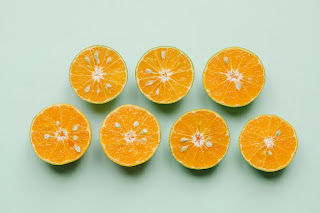What role does the relationship between Vitamin C and glutathione levels play in skin lightening?
It's significant because scientists have discovered that glutathione, L-cysteine, and the TYRP1 enzyme play a role in how our skin balances lighter (pheomelanin) and darker pigments (eumelanin).
We can argue that Vitamin C helps to lighten skin color because it has been scientifically established to increase gluthathione levels in the blood.
Glutathione
Almost all raw fruits and vegetables contain glutathione. Cooking eliminates the majority of glutathione, although this isn't a big deal. Because, despite the fact that glutathione may be found in a variety of fruits, vegetables, and meats, our stomachs and intestines have a limited ability to absorb it.
Please don't be deceived by gluthathione skin whitening tablets, by the way. Glutathione tablets and pills will not increase glutathione levels in your blood. You will only become poorer as a result of them.
Instead, eat foods strong in glutamine, such as lean meats, eggs, wheat germ, whey protein, and whole grains, to enhance glutathione levels in our blood. These will stimulate your liver, allowing you to naturally create more glutathione. One of the acknowledged substrates to gluthathione synthesis is glutamine. Supplementing with Vitamin C is vital if you wish to lighten your skin because high dosages of Vitamin C will also raise our natural glutathione levels. In vivo, glutathione and vitamin C have a significant functional relationship.
Note: If you take Tylenol (acetaminophen) frequently or in considerable doses, you may be deficient in glutathione. High dosages of N-aceytlycysteine (NAC), which boosts glutathione levels in the blood, are used to treat emergency cases of acetaminophen intoxication.
L-cysteine
L-cysteine is an amino acid that can be found in a variety of high-protein meals, such as yogurt and whey protein.
Onions, garlic, and broccoli are excellent vegetarian sources. The L-cysteine generated from N-Acetyl Cysteine (NAC) aids in the formation of glutathione in our liver. Proteins, taurine, coenzyme A, and inorganic sulfate are all made with L-cysteine.
The enzyme TYRP1 (or Tyrosinase-related protein 1)
I know, it sounds terrifying! But all you need to know is that this is the genetic component of the skin lightening debate. The TYRP1 gene gives us instructions on how to make the TYRP1 enzyme. Although the roles of this enzyme remain unknown, it is thought to be involved in the formation of melanin. This is most likely where our genes have a role in defining the hue of our skin.
Culocutaneous albinism has been linked to mutations in the TYRP1 gene.
It's vital to note that none of these elements determine our skin tone on their own. Each of the three is required to perform a role.
Pollution, smoking, alcohol, and diabetes are all enemies of vitamin C.
If you smoke or drink, your Vitamin C levels are likely to be lower than those who do not.
Do you reside in a polluted area, while we're at it? That will also work.
According to studies, drinking a lot of alcohol lowers the quantity of Vitamin C in your blood plasma and causes you to eliminate it through pee. Vitamin C levels in the blood are also reduced by smoking and pollution.
Diabetes lowers the amount of Vitamin C in your body.
So, what does it really imply? Is it necessary for me to take Vitamin C to lighten my skin?
Yes, yes, yes, yes, yes, yes, yes, yes, yes, yes, yes Vitamin C pills are crucial if you wish to lighten your skin internally by taking supplements, detoxifying, or changing your diet.
Dosage
Vitamin C should be consumed in high doses of 1,000 mg to 3,000 mg per day, either through supplements or foods. It's preferable to use a combination of the two.
















